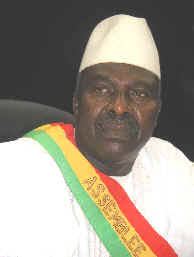Aboubacar Somparé facts for kids
Quick facts for kids
Aboubacar Somparé
|
|
|---|---|
 |
|
| President of Guinea Acting |
|
| In office 22 December 2008 – 24 December 2008 |
|
| Prime Minister | Ahmed Tidiane Souaré |
| Preceded by | Lansana Conte |
| Succeeded by | Moussa Dadis Camara |
| Guinea's Ambassador to France | |
| In office 1978–1984 |
|
| Secretary-General of the Unity and Progress Party | |
| In office 1995–2002 |
|
| President of the National Assembly of Guinea | |
| In office 2002–2008 |
|
| Personal details | |
| Born |
Aboubacar Somparé
31 August 1944 Dakonta, French Guinea |
| Died | 2 November 2017 (aged 73) Ratoma, Conakry, Guinea |
| Political party | Unity and Progress Party |
El Hajj Aboubacar Somparé (N'Ko: ߊߓߎߓߊߞߊߙ ߛߐ߲߬ߔߊ߬ߙߋ߫; 31 August 1944 – 2 November 2017) was an important politician from Guinea, a country in West Africa. He served as the President of the National Assembly of Guinea from 2002 to 2008. Before that, he was Guinea's Ambassador to France and a leader in the Unity and Progress Party (PUP).
Contents
Early Life and Career
Aboubacar Somparé was born in a place called Dakonta in 1944. He worked in education and government for many years.
Some of his early jobs included:
- Regional Director of Education in Labé (1970–1973)
- Director-General of Secondary Education (1973–1976)
- Director-General of Information Services (1976–1978)
From 1978 to 1984, he was Guinea's Ambassador to Paris, France. After returning home, he continued to work in government. He was also the Rector (head) of the University of Conakry from 1987 to 1989.
In 1995, Somparé was elected to the National Assembly. This is like the parliament or congress in other countries. At the same time, he became the Secretary-General of the Unity and Progress Party (PUP). He held these important roles until 2002.
Leading the National Assembly
In 2002, Aboubacar Somparé was re-elected to the National Assembly. The President of Guinea, Lansana Conté, chose him to become the President of the National Assembly. This is a very important position, as it means he was the leader of the country's law-making body.
He was officially elected to this role on 23 September 2002. He received strong support from the other members of the Assembly.
As President of the National Assembly, Somparé was the person who would take over as President of Guinea if the current president could no longer serve. This made his role very significant. In 2006, when President Conté went to Switzerland for medical treatment, Somparé reportedly met with military officers to discuss what would happen if the president could not return.
In 2008, Somparé spoke about the upcoming presidential election. He believed that President Conté, who was very ill, would not run for re-election. He also talked about why parliamentary elections had been delayed. He said elections should only happen if they help make society stronger and more democratic.
Events of December 2008
On 23 December 2008, Aboubacar Somparé made a sad announcement on television. He told the country that President Conté had died the day before after a long illness.
According to Guinea's laws, the President of the National Assembly (which was Somparé) was supposed to become the temporary President of the Republic. A new presidential election would then need to be held within 60 days. Somparé asked the head of the Supreme Court to officially declare the presidency empty and follow the constitution. The Prime Minister and the head of the army were with Somparé during his announcement.
However, just a few hours later, a military group announced on television that they had taken control of the country. This group called itself the National Council for Democracy and Development (CNDD). They said they had dissolved the government and suspended the constitution.
Somparé went into hiding because the new military leaders were looking for him. He asked other countries around the world to help prevent the military from stopping Guinea's democratic process. A few days later, he attended a meeting called by the military leaders.
Later Political Life
After the military took over, Somparé's political party, the PUP, was no longer in power. In 2009, there were discussions within the PUP about changing its leadership. Somparé and another party leader, Sékou Konaté, settled their differences in March 2009.
Somparé mostly stayed out of the public eye for a year after the military takeover. Unlike many other officials from President Conté's time, the military government left him alone.
In March 2010, Somparé was chosen as the PUP's candidate for the presidential election that was planned for June 2010.
Death
Aboubacar Somparé passed away on 2 November 2017.
See also
 In Spanish: Aboubacar Somparé para niños
In Spanish: Aboubacar Somparé para niños
 | May Edward Chinn |
 | Rebecca Cole |
 | Alexa Canady |
 | Dorothy Lavinia Brown |

